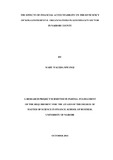| dc.description.abstract | Financial accountability has been one of the most problematic and prevalent issues for
business worldwide for a long time; however, there has been much more attention and
research dedicated to the topic after the scandals such as Enron, WorldCom and
others. Increase in financial misappropriation and number of corporate scandals had
an important impact on understanding and analyzing financial accountability and in
turn on audit of the same and its regulation. Poor economic management and
governance by African Governments has resulted in donors shifting their attention
and increasing funding to NGOs from the early 1990s. However, the NGOs are faced
by many fraud and corruption scandals and individuals abusing disaster relief and
donations with effect of financial accountability on efficiency remaining unknown.
This study therefore sought to bridge this gap by investigating the effect of financial
accountability on the efficiency of non-governmental organizations in Nairobi
County. The research adopted a descriptive design. The population consisted of all
NGOs registered with NGO Coordination Board in governance sector that were
located in Nairobi County from which a random sample of 72 NGOs in governance
sector. Data was obtained from primary data using structured questionnaire using the
Likert measurement scale. Data collected was sorted, classified, coded and analyzed
using Data Envelopment Analysis (DEA) to measure the efficiency of NGOs and
analyzed using SPSS version 21. Likert scale was highly used to measure the
variables. The study found that financial accountability has positive and significant
effect on efficiency of nongovernmental organizations in governance sector in Nairobi
County. Additionally, the study found that individually and combined, financial
accountability, staff experience and organization of NGOs have positive effect on
NGO efficiency. NGOs with flat hierarchy were found to have better flow of
information which promotes financial accountability and consequently efficiency of
the NGOs. The study also found that NGOs using high percentage of their income
from donor sources are less efficient than those using income from other sources. The
study recommends formulation of policies by the relevant regulatory bodies to ensure
that the NGOs enhance accountability for improved efficiency | en_US |

